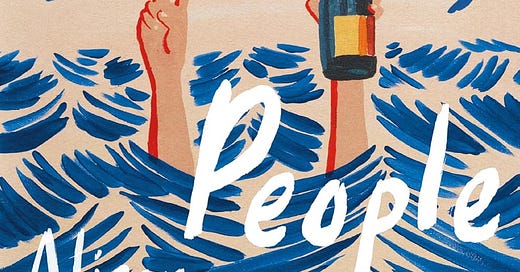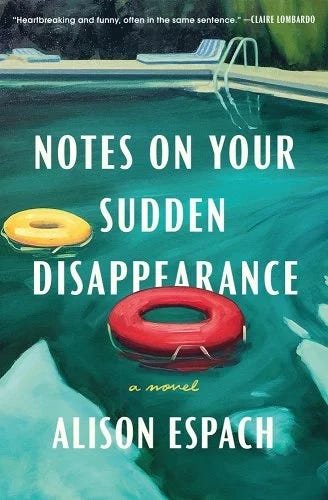I recall reading Alison Espach’s first novel, The Adults, and thinking how uncommonly assured it seemed for a first novel, sharp and funny, wise to the interiors of both teens and grown-ups. Notes on Your Sudden Disappearance, her second novel, knocked me out and I explained some of my appreciation in a previous newsletter post.
When I finished reading her new novel, The Wedding People, I thought that this was a book that could break through to a lot of readers. I was more right than I knew as by the time I finished it a couple weeks pre-publication, it had already been selected for the Jenna Reads Today Show Book Club, and was well on its way to being a New York Times best seller.
These are the kinds of events that make me feel good about the world of books and publishing, when a writer dedicated to her work over years puts out great books and ultimately receives the kind of attention she deserves.
Alison took some time out from a very busy schedule to answer some of my questions about how she balances light and dark in her work.
John Warner: It seems like both of your last two novels (Notes on Your Sudden Disappearance) and (The Wedding People) are fundamentally about sadness. At first I was going to say “depression,” but while you could describe Phoebe (TWP) and Sally (Notes) as “depressed,” it’s really that they’re, I don’t know…grieving?
Alison Espach: I appreciate you making that distinction—it’s hard enough telling the difference between depression and situational grief in my own life, even harder to do it for fictional characters. But it seems true to say they are both definitely grieving. Sally is grieving the loss of her older sister, but also the person Sally imagined she would become living a life alongside her sister. She doesn’t get to be a person with a sister anymore.
Creating Sally was, among other things, my attempt to understand my own grieving process after losing my brother when we were teenagers. I indulged in this fantasy that once I was older, I would be done with it. There’d be nothing sad anymore, nothing left to grieve, and I could finally just be happy. And while getting older has made way for new forms of happiness, I am a little amazed by how much there is still to grieve. Getting older really requires a lot of strength and courage to face every day. Nothing bad even needs to happen to you. It’s simply the fact that some doors have closed, some doors are closing as we speak, and cannot be reopened again.
So that is Phoebe’s grief in The Wedding People—Phoebe realizes that certain doors are closed to her forever, and she panics because she can’t see any other available doors. She is blinded by her grief. I wanted to put Phoebe in a position where other people could help spark something in her, reveal to her other possible doors, ones she had never imagined before.
JW: And those central characters aren’t the only ones grieving. Everyone orbiting Sally in Notes… is also grieving, and the engaged couple in The Wedding People are each coming through their own grief, Lila from the death of her father, and Gary, from the death of his first wife. There’s also Jim, Gary’s best man and his first wife’s brother, Gary’s daughter… It’s a panoply of grief! It’s like there’s infinite varieties. Is this anything you’re conscious of, or is it simply the byproduct of the characters and situation you’ve put together? Or something else entirely?
AE: I think maybe because of the way I grew up, I just assume everybody is secretly grieving something in their own private way as they walk about and try to be a person. Maybe that’s not true, but still, I’m fascinated by the idea that we’re all walking around with something intense inside of us that other people on the street don’t know about. I think weddings have a way of forcing these things to the surface. Weddings make people think about what they don’t want to reveal to other people at the wedding, and where they are at in their own lives—the question of happiness is central—are you happy? Are you living the life you want to be living?
JW: While all the characters seem to be experiencing profound grief, one of the hallmarks of your novels is that they’re funny. How do you see the darkness of grief interacting with what is clearly humorous intention in how you’re telling the story?
AE:I think the darkness of the grief is exactly what produces the humor. When I look back at my life, it’s the incongruity of certain moments that have made me laugh—the intensity of what I’m feeling in contrast with the indifference of my surroundings. I remember breaking up with someone at the airport once, and both of us were crying because we’d likely never see each other again, and a smiling man in a Hawaiian print shirt and a safari hat bumped into me. We looked at each other for a second—me with tears in my eyes and him with pure glee, a man about to go on vacation—and after he left, my ex and I laughed so hard. This man was in another universe, bumped into our sad one for just a second, and left. The break-up wasn’t funny, but the moment was funny. And that’s really the kind of humor that has helped me move forward in life—because something about our situation was now funny. That’s kind of a miracle.
So while there’s nothing funny about Phoebe’s despair in the book, there is something kind of funny when Phoebe’s despair is stuck in an elevator with a bride’s total happiness and self-absorption. Lila’s behavior seems so foreign to Phoebe, it starts to make her laugh. And how is that surprise burst of laughter going to change something for Phoebe? How is Phoebe’s despair going to ground Lila and change the way she views her wedding and herself? Those were the two guiding questions I wanted to answer.
JW: Despite The Wedding People opening with Phoebe’s intention of ending her own life, as a whole, the novel feels just a bit lighter in tone than Notes on Your Sudden Disappearance. For me, I think part of it was because much of Notes… shows Sally repeatedly going through the crucible of her grief, and while she’s frequently darkly funny in her observations of her own life and the weirdness of her parents, there’s this ever present scrim of emotional struggle. I hope it’s not too much of a spoiler to say that The Wedding People is primarily about Phoebe’s recovery from her lowest point, and for me, that makes for a different, lighter tone while still working through serious stuff.
AE:That does sound true to me. Probably because Sally never has the ability to recover her sister—she’s lost to her. So the book is about how to make peace with that and get through the mourning process. But even at the end of the mourning process, the person is still gone and I’m not sure how that couldn’t ever be anything but sad. Whereas in The Wedding People, Phoebe was the one who was lost, and maybe the lightness of tone comes with the fact that Phoebe can fully recover herself. And be better for it. Of course that doesn’t mean that Phoebe is done with sadness and that her past griefs don’t matter, but I think one of the gifts that getting older gives us is the ability to be more deliberate about how we want to live. And so the book becomes less about Phoebe’s grief and more about how Phoebe wants to live–which is something that gives me hope.
JW: This is your third published novel. Has it gotten any easier to do each time?
AE: In many ways, yes, but in some ways, no. I feel more deliberate about how I approach my writing now. It feels like I’m making more choices rather than being guided by some instinctual will. Writing when I was younger sometimes felt a lot like crossing my fingers and hoping it all works out. Now I have a good sense of what will probably work and what probably won’t work. I also have learned more about what I want from the type of novel I’m writing. If I’m writing a first-person narrative, I know better how to create intimacy between the reader and narrator. Now that I’ve written a third-person novel, I know how to zoom away and break that intimacy at key moments. It really helps to be familiar with the strange process that is writing a novel too—you don’t know what it’s supposed to feel like or how much failure is too much failure along the way. I’ve had moments when I really didn’t think I could go on with a certain manuscript or even continue being a writer. But now that I’ve gotten through that, three times, I know those moments of extreme self-doubt and failure are actually a very normal part of the process. At least for me.
But the hard part is still this: the next novel needs to be doing something entirely new. So while writing three novels has given me some reliable experience to bring with me into the new book, the hard part is starting something you’ve never done before. Which means, there will likely always be some part of me crossing my fingers again and hoping it works out.
JW: While I was reading The Wedding People I was thinking about how it would make terrific source material for a movie, and lo and behold, after I finish the book I go Googling and see that it’s been optioned with Nicole Holofcener writing the screenplay. This seems sort of perfect, yes?
AE: More than perfect, which I realize is not possible. But that’s how it feels. I’ve been a long-time admirer of Nicole Holofcener’s work. While it was completely surreal to hear that she wanted to adapt the screenplay, it also made a sort of sense to me. The Wedding People is a book that celebrates conversation—the funny ones, the absurd ones, the sad ones—and Nicole is so very good at that.
JW: And finally, the last question, which I’m going to start asking everyone I talk to. What’s one book that you think people might not be aware of, but which is worth reading?
AE: I just read Green Dot by Madeleine Gray, and it was remarkable. Every line is both incredibly funny and insightful. It’s a thrilling exploration of the sadness and hilarity of infatuation. Honestly, it’s exactly the kind of novel I am always wanting to read.
Previous recent author Q&A’s:
Observations Within Landscape with Ben Shattuck.





